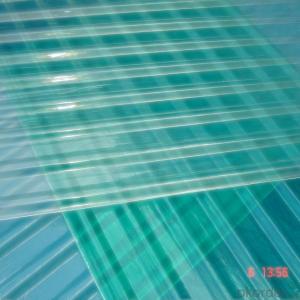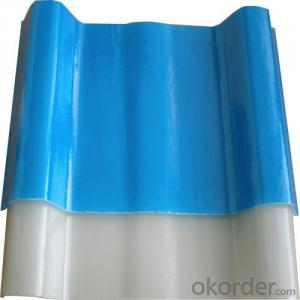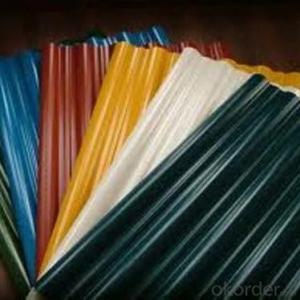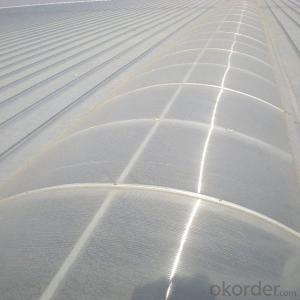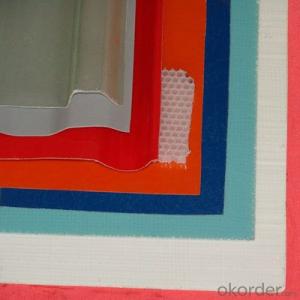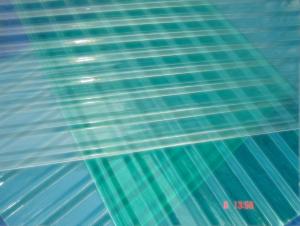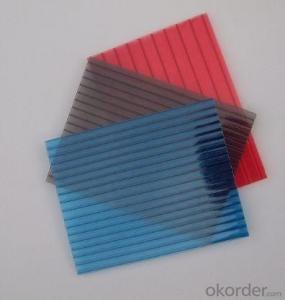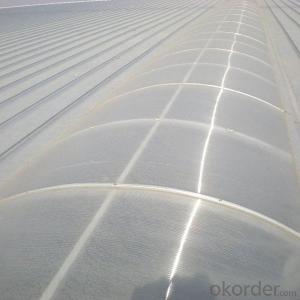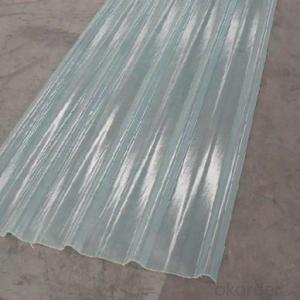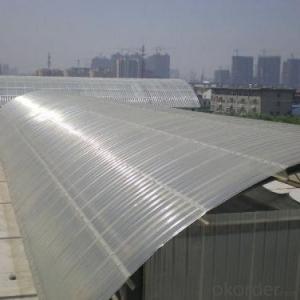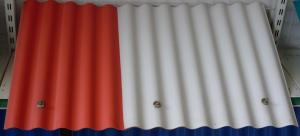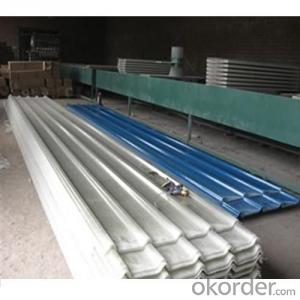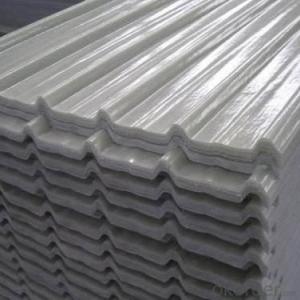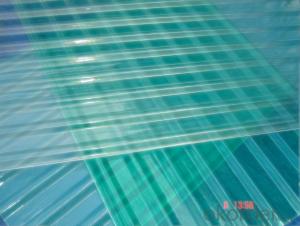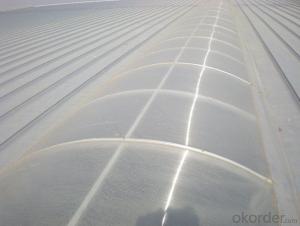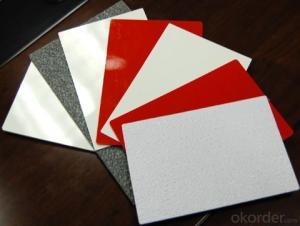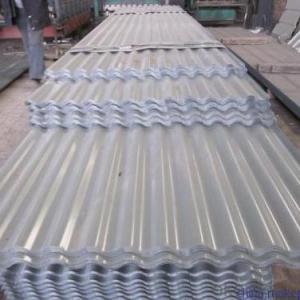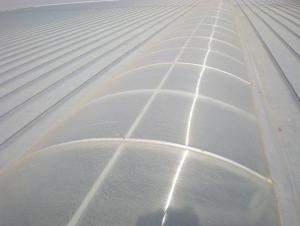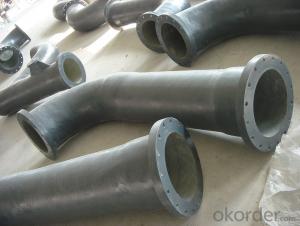FRP Corrugated Plastic Roofing Custom Design Roof
- Loading Port:
- Tianjin
- Payment Terms:
- TT OR LC
- Min Order Qty:
- 300 m
- Supply Capability:
- 50000 m/month
OKorder Service Pledge
OKorder Financial Service
You Might Also Like
Item specifice
PRODUCT DESCRIPTION
Fiberglass corrugated sheet is usually used in construction site as protecting facility. It is dagarous for workers in building site since you never know if there is something hard drop down from the high area. So corrugated sheet is installed for preventing the stuff dropping down to hurt people.
FRP GRP Fiberglass Glassfiber Corrugated Roofing is a patent of our company, not like other FRP products, it is produced without yarn, instead, we use mat only. Therefore, the corrugated sheet is more strong in both horizontal and vertical direction.
FEATURES
1). Light Transmission: The light transmission of FRP roof sheet is between 3%-85%. Light through FRP corrugated sheet scatters and is mild. It will not form a light so as to make the indoor brighter.
2). Weather resistant: The UV agent mixing in the corrugated sheet, which can truly resist the damage of ultraviolet ray, which can truly resist the damage of ultraviolet ray.
3). Flame retardant: B1 grade.
4). Anti-corrosion: It resists chemical corrosion and its life span is over 3 times longer than zinc panel.
5). Water proof:100% water proof.
6). Impact capacity: resist impact, tensile and hardly breakable.
7). Light weight: the weight is light, etc
SPECIFICATION
Name: | FRP Roofing |
Material: | Fiberglass |
Width: | 880mm/1050mm |
Effective width: | 800mm/960mm |
Wave length: | 160mm |
Wave height: | 30mm |
Pitch: | 220mm |
Thickness: | 3/2.5mm |
Length: | Customized but must be a multiple of wave pitch |
Color: | Purplish Red, Brick Red, Grey, Green, Blue or customized |
Application: | House, villa, pavilions, industrial plants, large warehouses, supermarkets, stadiums etc |
MOQ: | 1000 Square meter |
PICTURES
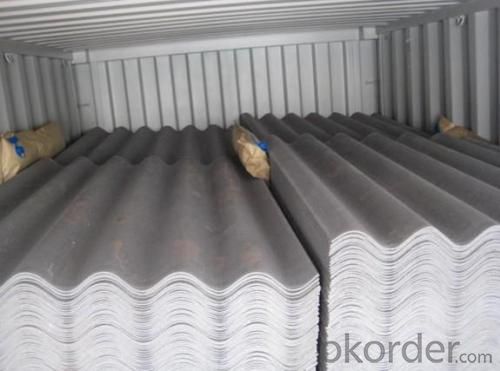
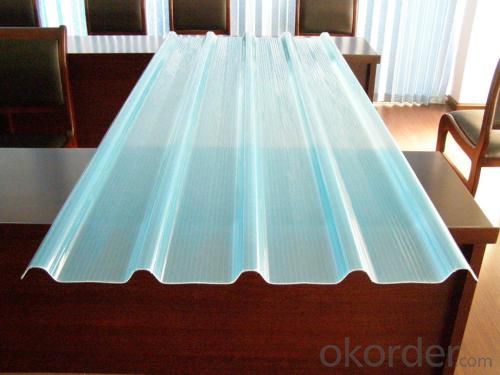
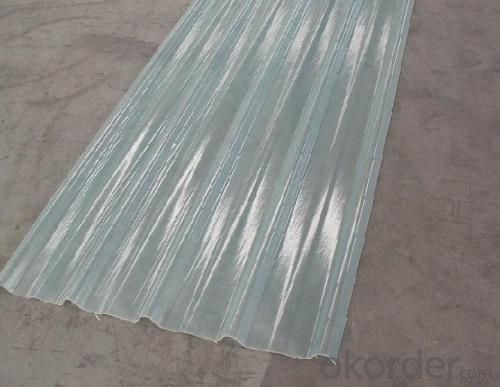
- Q:Can FRP roofing panels be used for airports?
- Yes, FRP (Fiberglass Reinforced Plastic) roofing panels can be used for airports. FRP panels are lightweight, durable, and resistant to corrosion, making them suitable for various applications, including airports. They are commonly used for roofing structures due to their strength and ability to withstand harsh weather conditions. In airports, FRP roofing panels can be utilized in various areas, such as hangars, terminals, control towers, and other facilities. Their lightweight nature makes them easy to handle and install, reducing labor and construction costs. Additionally, FRP panels offer excellent thermal insulation properties, which can help regulate temperatures within the airport structures, leading to energy savings. Furthermore, FRP roofing panels are resistant to UV rays, chemicals, and fire, providing enhanced safety and security for airport facilities. Their resistance to corrosion makes them ideal for areas exposed to moisture, such as near runways and aircraft maintenance areas. Overall, FRP roofing panels are a suitable choice for airports due to their durability, lightweight nature, resistance to corrosion, and ability to withstand various weather conditions.
- Q:Can FRP roofing panels be used for green roofs?
- Yes, FRP (Fiberglass Reinforced Plastic) roofing panels can be used for green roofs. Green roofs are designed to support the growth of plants and vegetation, and FRP roofing panels can provide a suitable base for this purpose. FRP panels are lightweight, durable, and have excellent resistance to water and weathering, making them ideal for green roof applications. Additionally, FRP panels can be designed with specialized features like drainage systems or built-in insulation, further enhancing their suitability for green roof installations. Overall, FRP roofing panels can offer a reliable and long-lasting solution for creating green roofs.
- Q:Do FRP roofing panels require specific safety certifications?
- FRP (Fiberglass Reinforced Plastic) roofing panels do not typically require specific safety certifications. However, it is important to note that safety certifications and standards may vary depending on the country or region. In general, FRP roofing panels are known for their durability, resistance to corrosion, and fire retardant properties, which make them a safe choice for roofing applications. However, it is always recommended to check with local building codes and regulations to ensure compliance and safety. Additionally, it is important to follow the manufacturer's specifications and guidelines for installation and maintenance to ensure the longevity and safety of FRP roofing panels.
- Q:Do FRP roofing panels require a specific type of sealant?
- Yes, FRP (Fiberglass Reinforced Plastic) roofing panels do require a specific type of sealant. It is important to use a sealant that is compatible with the materials used in FRP panels, such as fiberglass and resin. Silicone-based sealants are commonly recommended for FRP roofs as they offer excellent adhesion to these materials and provide a long-lasting seal. Additionally, it is crucial to choose a sealant that is designed for outdoor use and is resistant to UV rays and weathering to ensure the longevity of the roof. Properly sealing the FRP roofing panels with the appropriate sealant is essential to prevent leaks, water damage, and to maintain the overall integrity of the roof. It is advisable to consult with the manufacturer or a roofing professional to determine the specific sealant that is recommended for your FRP roofing panels.
- Q:Can FRP roofing panels be used for awnings?
- Yes, FRP (Fiberglass Reinforced Plastic) roofing panels can be used for awnings. FRP panels have several characteristics that make them suitable for awning applications. Firstly, they are lightweight, which makes them easy to install and handle. Secondly, FRP panels are highly durable and resistant to weathering and UV radiation, ensuring that they can withstand the elements for a long time. Additionally, FRP panels are available in various colors and designs, allowing for a wide range of aesthetic options for awning designs. Overall, FRP roofing panels provide a cost-effective and reliable solution for awnings, offering both functionality and visual appeal.
- Q:Can FRP roofing panels be installed on both residential and commercial covered walkways?
- Yes, FRP roofing panels can be installed on both residential and commercial covered walkways. FRP (Fiberglass Reinforced Plastic) roofing panels are versatile and durable, making them suitable for various applications, including covered walkways. Whether it is a residential or commercial setting, FRP roofing panels offer excellent weather resistance and can provide a long-lasting and aesthetically pleasing solution for covered walkways.
- Q:Are FRP roofing panels suitable for both residential and commercial buildings?
- Yes, FRP (Fiberglass Reinforced Plastic) roofing panels are suitable for both residential and commercial buildings. FRP panels offer a range of benefits that make them an excellent choice for roofing applications in both types of structures. Firstly, FRP panels are lightweight yet incredibly strong, making them suitable for use in various building types. Whether it's a small residential home or a large commercial building, FRP panels can provide reliable and durable roofing solutions. Additionally, FRP panels are highly resistant to corrosion, UV rays, and weathering. This makes them particularly suitable for both residential and commercial buildings, as they can withstand the elements and maintain their structural integrity over time. Whether it's exposure to harsh weather conditions or the need for long-term durability, FRP roofing panels are up to the task. Furthermore, FRP panels are versatile and can be customized to meet the specific requirements of residential and commercial buildings. They are available in various sizes, colors, and designs, allowing for flexibility in architectural aesthetics. Additionally, FRP panels can be easily installed, reducing the time and cost associated with roofing projects. In terms of energy efficiency, FRP panels can contribute to reducing energy consumption in both residential and commercial buildings. Their insulation properties help regulate temperature, reducing the need for excessive heating or cooling. This can result in energy savings and improved comfort levels for occupants. Overall, FRP roofing panels are a suitable choice for both residential and commercial buildings. Their lightweight yet strong nature, resistance to corrosion and weathering, versatility, and energy efficiency properties make them an excellent option for various roofing applications.
- Q:Can FRP roofing panels be installed on restaurant patios or outdoor dining areas?
- Yes, FRP (Fiberglass Reinforced Plastic) roofing panels can be installed on restaurant patios or outdoor dining areas. FRP panels are lightweight, durable, and weather-resistant, making them suitable for outdoor applications. They offer excellent protection against UV rays, rain, and other environmental factors, ensuring a comfortable and enjoyable dining experience for guests. Additionally, FRP panels are easy to install and maintain, making them a practical choice for restaurant owners looking to enhance their outdoor spaces.
- Q:Can FRP roofing panels be used for residential buildings?
- Yes, FRP roofing panels can be used for residential buildings. FRP (Fiberglass Reinforced Plastic) roofing panels offer several advantages for residential applications, such as durability, lightweight construction, and resistance to corrosion and UV radiation. They are commonly used for both commercial and residential structures due to their long lifespan, low maintenance requirements, and ability to withstand various weather conditions. Additionally, FRP panels provide excellent insulation properties, making them a suitable choice for residential buildings.
- Q:Are FRP roofing panels resistant to impact from falling objects?
- Known for their high impact resistance, FRP (Fiberglass Reinforced Plastic) roofing panels are commonly utilized in industrial, commercial, and agricultural settings. These panels are designed to endure various environmental conditions. However, the level of impact resistance may vary depending on factors such as thickness, quality, and manufacturer specifications. In essence, FRP roofing panels are engineered to possess remarkable durability, enabling them to withstand the force of falling objects. They are comprised of multiple layers of reinforced fiberglass and a resin matrix, which provide strength and rigidity. This composition effectively disperses the impact force over the entire surface of the panel, reducing the risk of damage or breakage. It is crucial to note that while FRP roofing panels are engineered to withstand normal impacts, they may not be entirely impervious to all types of falling objects. Objects that are excessively heavy or sharp, such as large tools or metal items, have the potential to cause damage upon impact. To ensure optimal performance and longevity, it is advisable to consult the manufacturer's guidelines and specifications specific to the FRP roofing panels being used. Additionally, proper installation, regular maintenance, and periodic inspections are essential for identifying and addressing any potential issues arising from impacts or other factors. These practices guarantee the enduring durability and impact resistance of the FRP roofing panels.
1. Manufacturer Overview |
|
|---|---|
| Location | |
| Year Established | |
| Annual Output Value | |
| Main Markets | |
| Company Certifications | |
2. Manufacturer Certificates |
|
|---|---|
| a) Certification Name | |
| Range | |
| Reference | |
| Validity Period | |
3. Manufacturer Capability |
|
|---|---|
| a)Trade Capacity | |
| Nearest Port | |
| Export Percentage | |
| No.of Employees in Trade Department | |
| Language Spoken: | |
| b)Factory Information | |
| Factory Size: | |
| No. of Production Lines | |
| Contract Manufacturing | |
| Product Price Range | |
Send your message to us
FRP Corrugated Plastic Roofing Custom Design Roof
- Loading Port:
- Tianjin
- Payment Terms:
- TT OR LC
- Min Order Qty:
- 300 m
- Supply Capability:
- 50000 m/month
OKorder Service Pledge
OKorder Financial Service
Similar products
New products
Hot products
Related keywords
